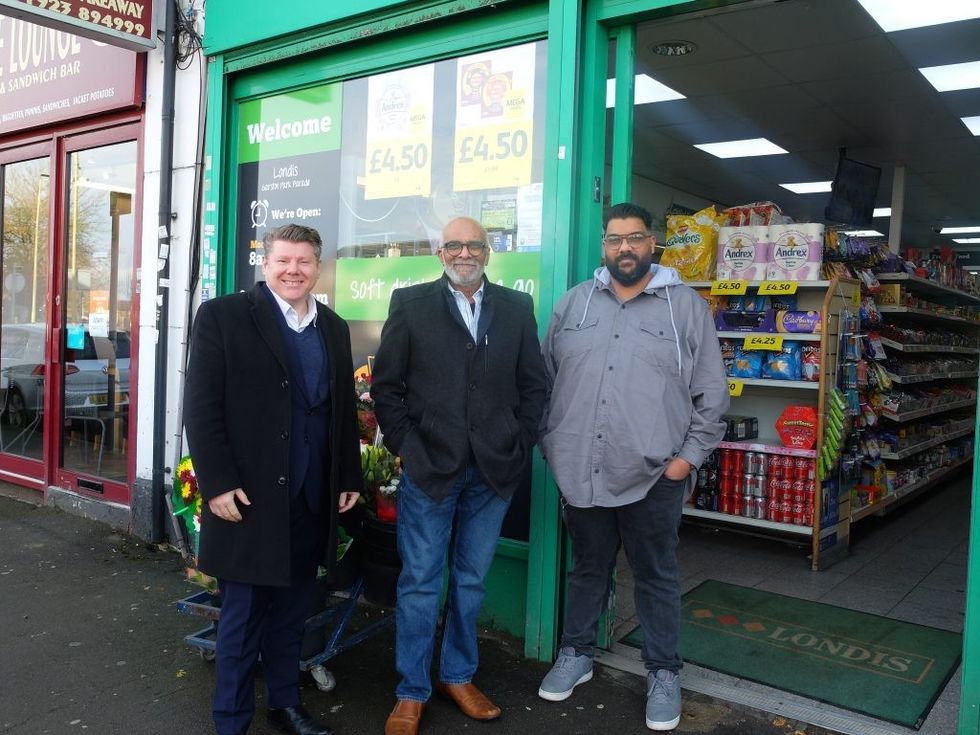Local retail hero CK Shah gets his chance to question directly Dean Russell, the local MP – who turns out to be a customer!
It was a bright February morning when Asian Trader arrived at Londis Garston Park Parade in Watford to attend a meeting between the local MP, Dean Russell, and Watford veteran retailer Mr CK Shah, who has been running his store on this site since 1988. As a storeowner who has witnessed every prime minister from Margaret Thatcher to Rishi Sunak, Mr Shah has his strong opinions about how things are going.
It was a wide-ranging conversation despite Mt Shah’s expression of concern about the hardships he observes local shoppers suffering, and which he largely blames for the rise in shoplifting.
Topics such as inflation and fuel company profits, minimum wage and skyrocketing costs, crime and abuse of staff, and the upcoming disposable vape and generational tobacco bans, were all well-aired.
Speaking aloud
CK Shah:“I came here from India in 1979 and then I bought this business in 1988, and right now I’m running it myself with my son – the next generation,” says Shah. "Until now, I have seen many changes locally and community-wise, and we've been very close to the community and local people.”
Asian Trader: How would you say you're important to the local people?
CK Shah: Locals need stores like this for their everyday survival. They want a newspaper every day. The old people, they are not computer techies, they want you to buy the physical paper. I'm also providing facilities for when they want to pay their utility bills or they want to play the lottery. Those are services the community needs. If the government is not going to improve the economy,it will be difficult for shopkeepers like me to continue.
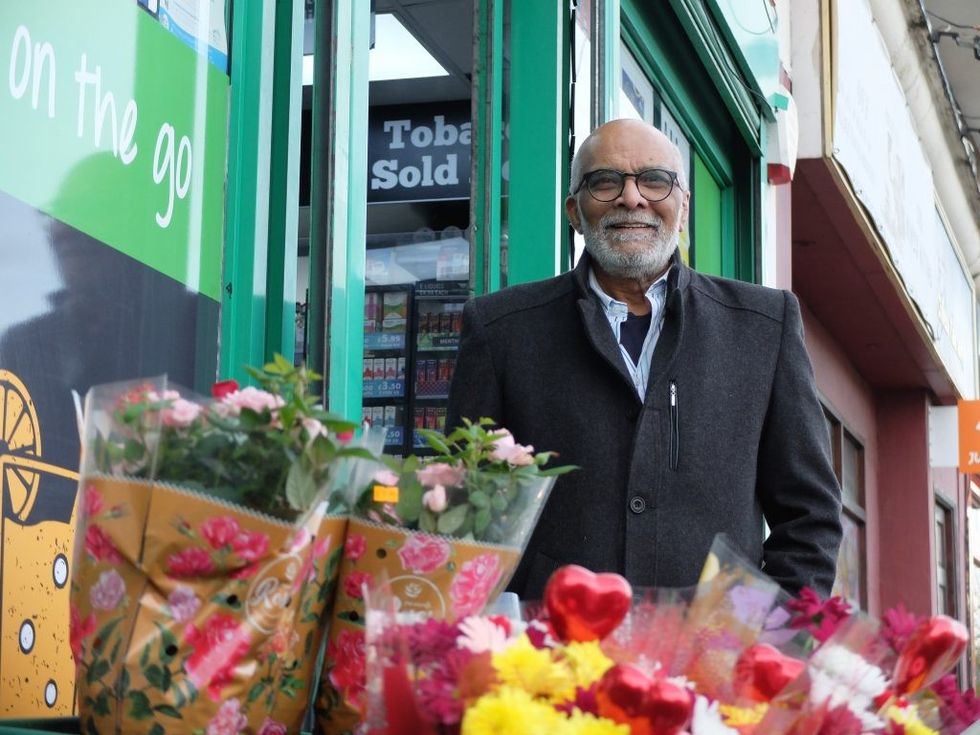
The customers are loyal to us and we are loyal to them. It’s a two-way thing: whenever the community needs us, we are there and they are there for us. That is the main success of the business. We support local people and charities and schools, and when a care home has a raffle, for example, we donate whatever they want.
AT: What are your biggest concerns?
CK Shah: Mostly economical. I see it is difficult for so many people even to provide an end-of-the-day meal. And that's where we work with them sometimes, but I think the environment has to be changed for the better and I think somewhere along the line an MP’s job is to make sure that everything's fine in the country.
After COVID, with prices rising so high, it's very difficult to survive, and I hope we'll do something at the same time about local ratesto make sure local businesses can survive.
Since these prices increases you can see shoplifting and crime has gone up. But then the government must deal with the poverty in the country, that’s the main issue. People are looking to feed the stomach.
AT: What do you want to ask Dean Russell MP?
CK Shah: To change the local environment. As a local MP his job is to make sure the local community is happy about what he is doing to protect the local people.
Taxes
CK Shah: You cannot afford to put the taxes down. How can you get inflation down and taxes down? It’s just impossible.
Dean Russell: It's absolutely possible because by reducing tax we can help to increase growth. But ultimately if people have more money in their pockets, how are they going to be able to spend it in stores like this. So, it's about making sure when people who work hardget to keep more money than they do at the moment.
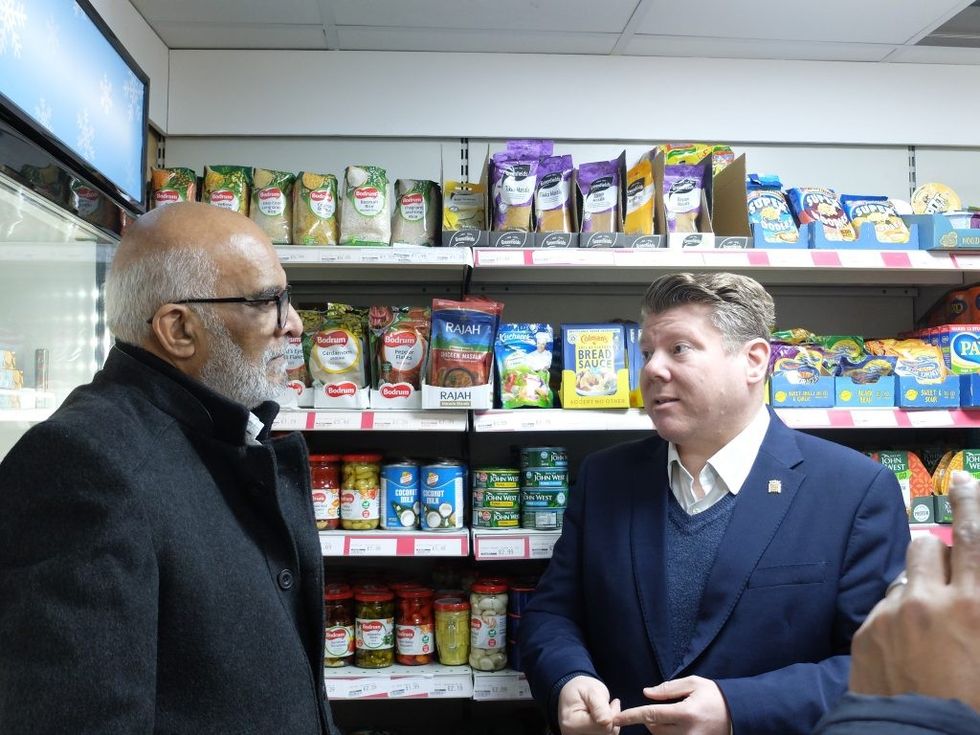
We've had a massive challenge, as you've seen during the pandemic. We've had the Ukraine war that massively impacted the cost of living, and the cost of stuff has gone up, but what we're trying to do is get costs down, through reducing inflation, reducing taxes, but also being more efficient in how those taxes are spent.
CK Shah: It looks good on paper but it’s not working. One minute you say okay, well, you want people to have more money in their pocket, but the IMF says Britain cannot afford to bring taxes down. If you do that, then the inflation will go up.
Dean Russell: It’s because inflation is coming down we've been able to reduce taxes. Someone on an average wage of £35,000 now keeps about £450 more than before. So it all ties together and reducing taxes means that we've got an opportunity for people to have more money to spend in stores like yours.
Business costs
CK Shah: Costs to my businesss are like a spiral effect because at the same time your mortgage interest is gone up, you're raising domestic commercial rates – right now we are getting a discount but next year it will go up. As a small shopkeeper, my electricity bill last year went up by 70 per cent, although my revenue is the same. Tell me how I can do that when the company supplying the electricity made a huge profit while I've been penalized. How come the government is not involved in [stopping] that?
Dean Russell: There's lots of ways that the government is taking specific measures to try and help but it does take time to come through.
When you look at the impact of some of the measures around the green energy side of things, they will take time to have an impact on people's pockets. But that will be a long-term measure that will make a massive difference.
The money that you're spending on electricity now, for your chillers, for lighting and so on, that will gradually come down over time. Some measures do have a cost impact in the short-term, but ultimately, it means that in your business over the next 30 years, you'll start to see costs coming down and see the impact and the benefit on the environment.
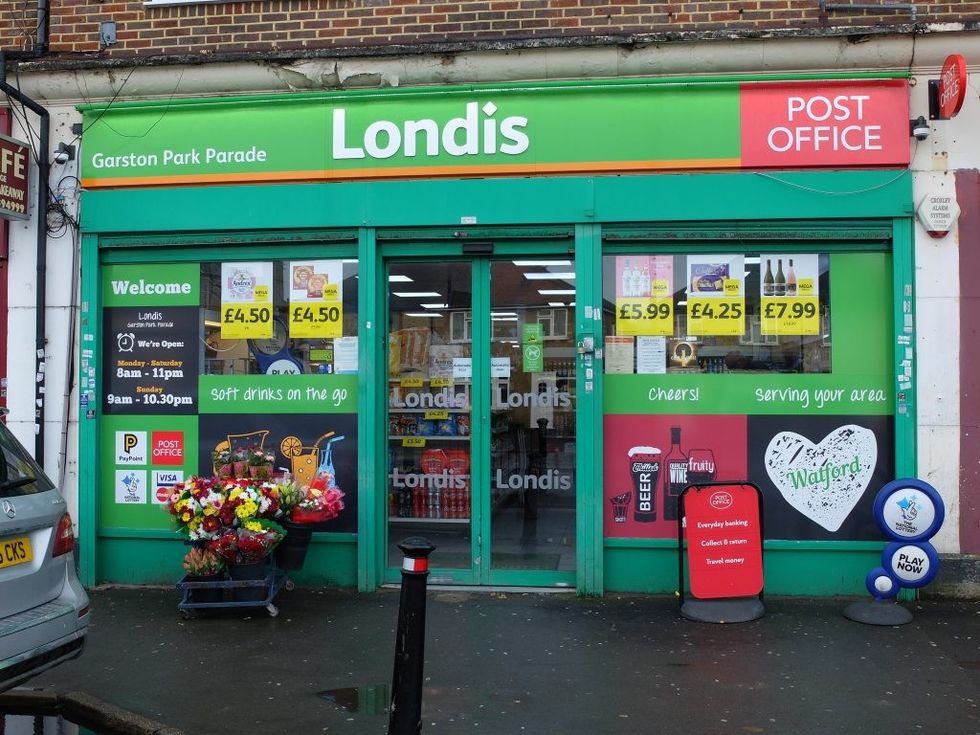
When Russia invaded Ukraine, it showed the world that our reliance on other countries for our energy has a massive impact on the UK. Being able to make energy secure means that those costs won't be as impactful, and we won’t pay over the odds for something that we can produce ourselves.
If you look in Scotland, we've done a lot of work there around the offshore cost for oil and gas, which some have criticised us for, but it means that we've got our own supply where we need it.
Crime and shoplifting
CK Shah: When people don't have any money end up begging. I can find two people sitting outside my shop begging just this morning. So I agree with you, I want to do the policies, you want to take the taxes down. But would it affect those people and be able to bring them back into the local community living? Shoplifting is down to people not being able to afford to fill their stomachs
They do the criminality because they need food in the stomach.
Dean Russell: Well, that's where we need to make sure we've got the right supports in place. And that's where a lot of work is going into that. Concerning the benefits system, the DWP are doing incredible work at the moment looking at how we can make it work for those who are really struggling but cannot do a job, and for those who can work to make sure they have an opportunity for a job and a career with prospects.
Vape and tobacco bans
CK Shah: In my opinion, this is not an illicit business but it is punishing everybody – like me – when you pass such bans in parliament.
Dean Russell: It's not about trying to punish anyone. I understand it, and I wasn't involved in the consultation or the decisions. Some of the most precious things in all our worlds are our kids. Vapes for a while were a replacement for cigarettes, but now we're seeing a younger generation go straight to vapes. It's getting them hooked on something that we'd never want them to be hooked on. So for me, it's about making sure that we don't have a generation of kids who are taking something that's not protected, not good for them.
CK Shah: We get abuse. When we refuse to sell them vapes, tobacco, alcohol. And they may be 20 years old and they look at like, “What nonsense are you talking?” That is how the world is, but putting laws through parliament will have a direct effect on shopkeepers, their environment and businesses.
Dean Russell: What we're seeing is stuff like bubble gum-flavoured vapes, all sorts of things which are targeting children. So I totally get your point, and the concerns from shopkeepers. But I think if we can start to get to a point where young kids aren't getting hooked on something that they shouldn't be having, that's got to be a good thing. But I appreciate the challenges and I'm deeply concerned about stories of abuse of shopkeepers, and so on.
The generational change with regards to stopping smoking and banning cigarettes, that's going to just really just catch up each year with the age you can start smoking, and so hopefully within five, 10 or 20 years it will hopefully end smoking for good. But of course, it's not going to be as simple and straightforward. These things never are.
Living locally
Dean Russell, MP for Watford, speaks out.
I'm Dean Russell, the Member of Parliament for Watford. And it's been great to be here to chat to Mr Shah, one of our fabulous local shopkeepers who do amazing work in the community. I've always been very supportive of small businesses. I was a small business minister and formerly a small business Ambassador. The reason why I'm so passionate is because I know that not only do they contribute the most to the economy, from a business perspective – when it comes to the size, 99 per cent of all businesses are small businesses – but I understand the challenges they face. And I think when it comes to convenience stores, and when it comes to amazing shops like this, they're not just shops and businesses, they are part of the community.
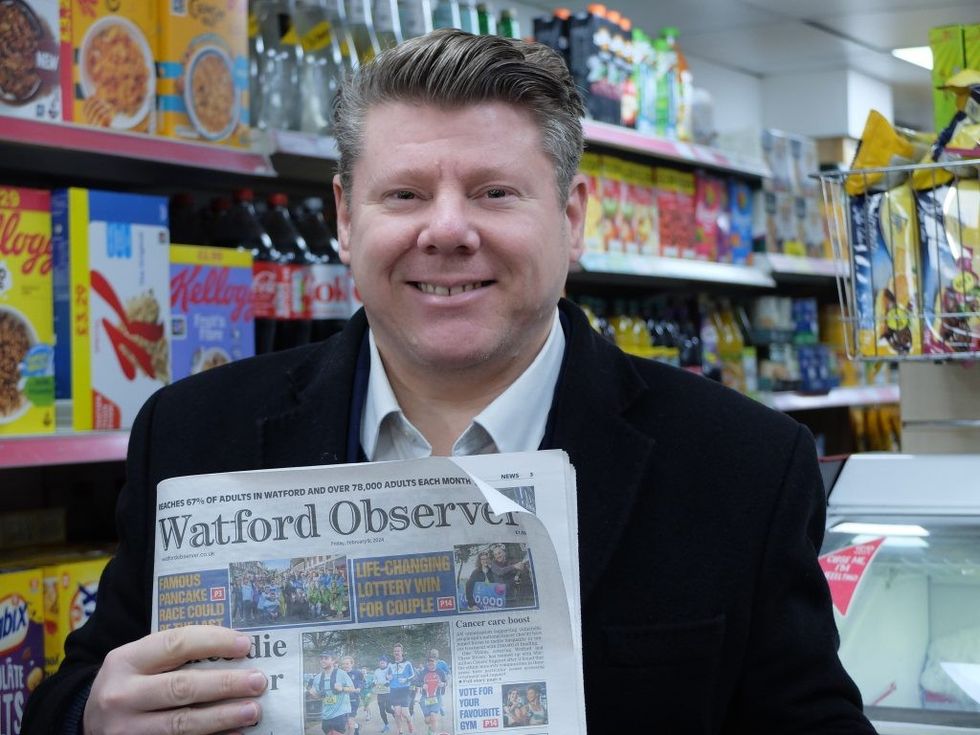
The conversation we had today was about some of the challenges people are facing and I totally accept we've had a tough few years, especially with the pandemic, lockdown and of course the war in Ukraine, that have had impacts on the cost of living. But one of the things that we are talking about is how we help people get on their feet. How do we help them have more money in their pocket? And that's why I'm very supportive of tax cuts that have been coming through, and hopefully there'll be some more in the upcoming spring budget.
More than halving inflation over the past year or more, from 11 down to four per cent, is really important because what that means is the cost of everything starts to come down. Ultimately, though, what it means is that when people have money in their pockets, they're more likely to be able to visit shops like this and spend that money.
I know some of the challenges that were raised were around criminality and abuse of staff and I'm going to go away and look into these issues. I'm aware shoplifting is one of the challenges that you all face, and there's a lot of work going on to try and tackle it from a government and policing perspective


